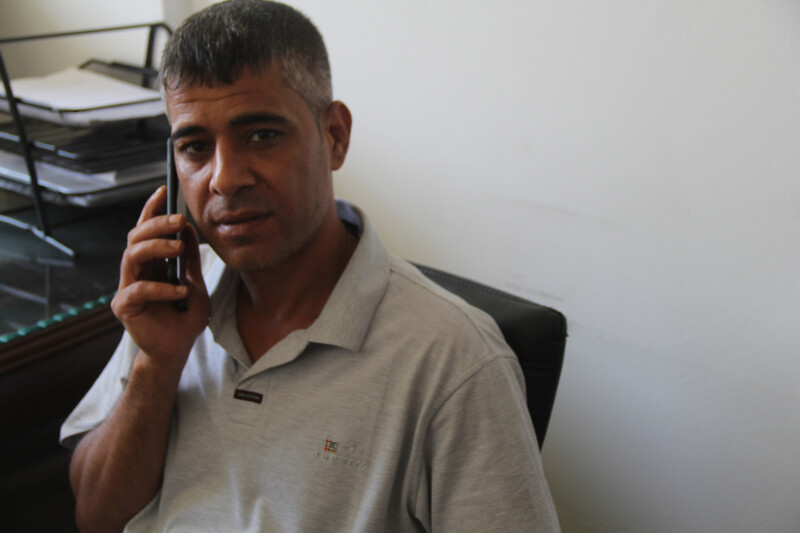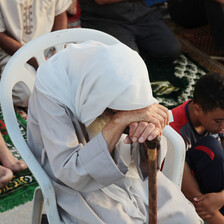The Electronic Intifada Gaza Strip 1 November 2016

Israel prevented Ahmad Nattat’s wife Samira from traveling to access cancer treatment because his name was on her ID.
For Samira Shawamreh, the cost of cancer treatment was that she and her husband had to divorce.
In 2014, Samira was diagnosed with bowel cancer. For treatment, she had to travel regularly between Hebron, where she then lived, and hospitals in Jerusalem and Beit Jala, also in the occupied West Bank.
On her way to these hospitals, she was frequently stopped at Israeli military checkpoints. Sometimes she was held for hours before being allowed to continue. On occasion, she was told she could not go any farther.
The Israeli soldiers at the checkpoints claimed that Samira’s identity card bore the name of a “terrorist.” The name in question was that of her husband Ahmad Nattat.
In 2011, Ahmad was arrested by Israeli forces at the Allenby crossing between Jordan and the West Bank.
He was interrogated for more than 60 days. During this period, he was accused of involvement in armed resistance against the Israeli occupation when he previously lived in the West Bank. Ahmad also was charged with carrying out and assisting “terrorist” attacks and refusing to provide details when questioned about people wanted by Israel.
He was convicted of the charges against him. Originally, he was sentenced to eight years imprisonment. But, after his lawyer appealed against that ruling, the sentence was reduced to two years, Ahmad told The Electronic Intifada.
Ordeal
Samira suffered considerable pain at Israeli checkpoints. “I was not even able to stand,” she said.
To end her ordeal, Samira needed to have Ahmad’s name removed from her ID card. That required a divorce.
“The decision to get a divorce was the hardest one I have ever made,” Samira said by telephone. “But I was forced to because of the severe deterioration of my health.”
Samira (now 37) and Ahmad (now 38) met in Ramallah, a city in the West Bank. Ahmad, who grew up in Gaza, moved to Ramallah in 2000, seeking employment. He found a job in a supermarket, where he met Samira. The couple married in 2001.
Four years later, Ahmad and Samira went to live in Gaza. Samira began feeling pains in her stomach in 2009. She had surgery in a Gaza hospital, but her condition worsened afterwards.
Blocked from traveling
Both of them then tried to travel to the West Bank so that Samira could have further tests and treatment. After many attempts, Samira was granted a travel permit by the Israeli authorities. But Ahmad was refused.
The couple had to spend the next two years apart. Ahmad kept applying for permits to visit Samira, who was now living in Hebron. Israel kept turning him down.
Eventually, he set out on a roundabout journey, in the hope he would be reunited with Samira. He left Gaza, traveling through Egypt, and then tried to enter the West Bank via Jordan. His arrest at the Allenby crossing came as a shock.
Ahmad admits that he allowed some people who were involved in armed resistance against Israel to hide in his home in the West Bank during the early years of this century. He had no direct involvement in armed resistance, he said.
“The accusations made against me in the Israeli court were mostly false or exaggerated,” he said.
Samira was only able to visit Ahmad three times while he was imprisoned by Israel. On his release, he was returned to Gaza.
When he learned of Samira’s diagnosis and how Israel was impeding her treatment, Ahmad reluctantly came to the conclusion that they would have to divorce. “I did everything I could to stop this from happening,” he said. “But her need for treatment was urgent.”
“Darkest times”
Samira says that being away from Ahmad increased her anguish during treatment. “I missed having Ahmad by my side and supporting me at those darkest times,” she said.
The two are still very much in love. Despite the divorce, they speak constantly by telephone. Ahmad has saved Samira’s number in his cellphone under the name Habibti, the Arabic word for sweetheart.
The past few months have been especially difficult as Samira’s mother, with whom she lived in Hebron, died recently.
“I feel very lonely,” said Samira. “I hope that I will be able to reunite with Ahmad. But it is still very hard to go back to Gaza. My treatment has not ended yet.”
Samira and Ahmad said they have sought help from Palestinian political leaders, human rights groups and the International Committee of the Red Cross. They realize that they face an uphill struggle to be allowed to live together.
Israel has been tearing Palestinian families apart for decades. Since 1988 Israel has restricted Palestinian movement between the West Bank and Gaza.
The policy has become more severe over the years. At present, Israel’s stated policy is that travel between the West Bank and Gaza is permitted in “exceptional humanitarian cases only, particularly urgent medical cases.” Israel does not recognize that married couples have a right to live together.
With Ahmad’s name removed from her ID card, Samira now finds it easier to travel through Israeli checkpoints.
“I can freely move between hospitals in Jerusalem and the West Bank,” Samira said. “What a price we have paid to win this freedom.”
Maram Humaid is a Gaza-based translator and journalist.





